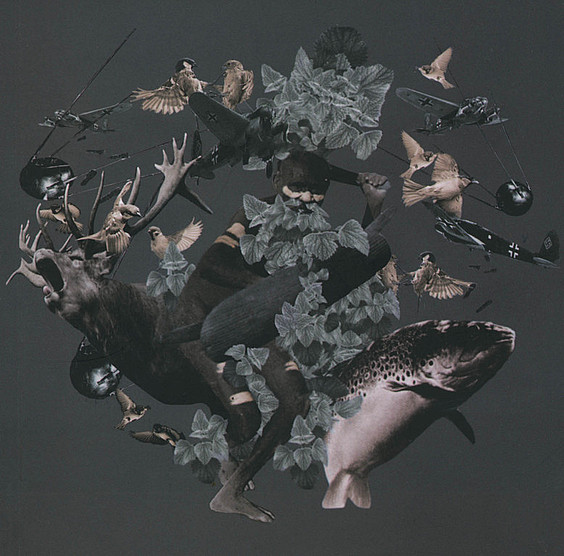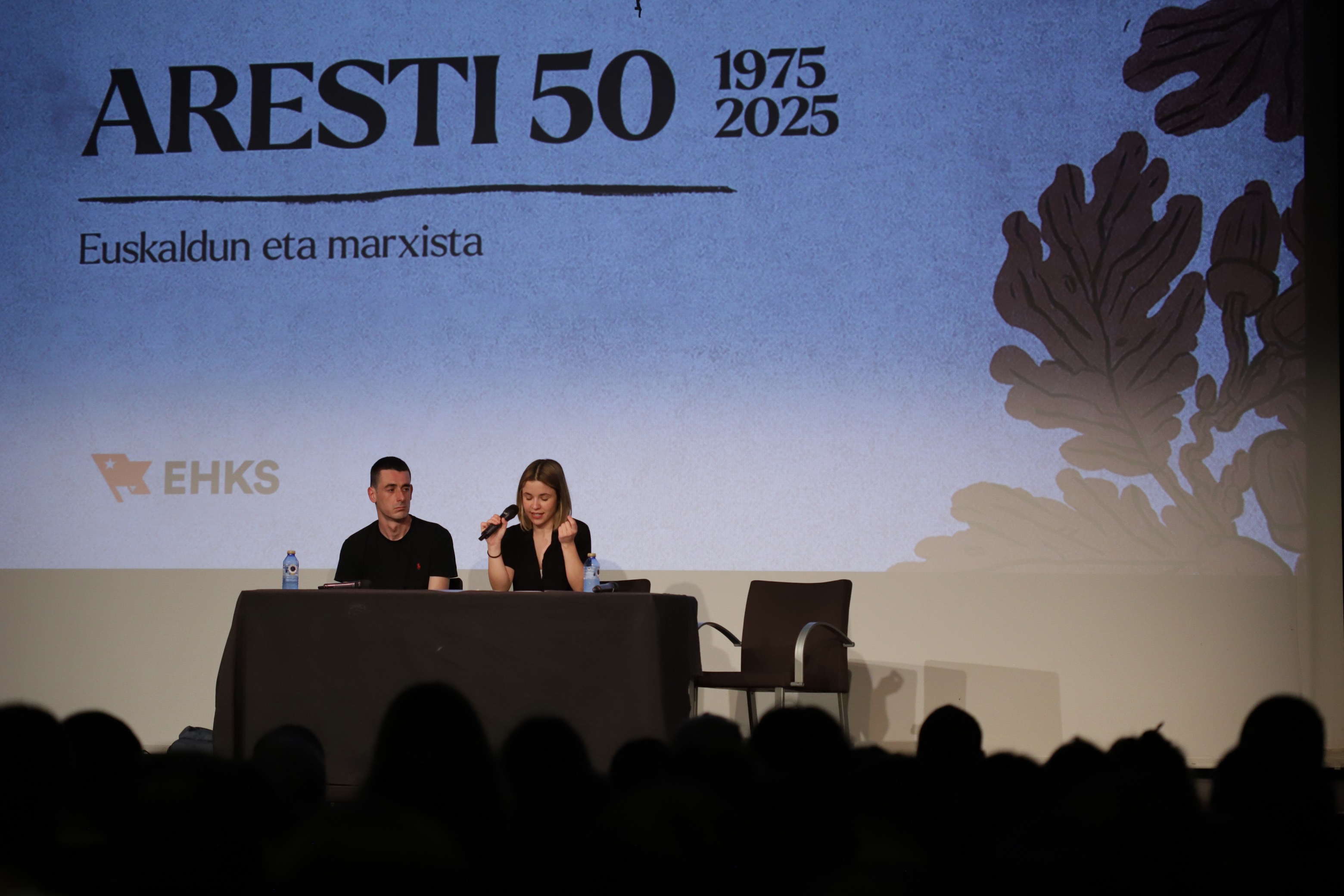"Liberation is contemplated in this country as if it were political in the void"
- In 2016, the publication Lardaska has played a role: the author of the self-published magazine published in book format is unknown, it comes signed by "Barbalot" with the prologue of Koldo Izagirre. It goes without saying that these peculiarities have aroused curiosity in the world of Basque letters. Respecting the anonymity of the author, we talked about "what" and "how" rather than "who" in this e-mail interview.

There is a feeling that you are not satisfied with the march of Basque literature: "He writes to publish, to publish for press conferences, to offer to be the owner of the looks..." Should we consider as a reaction to this the publication of Lardaska as it has been published?
Self-production and anonymity may have been chosen to avoid “artistic communion.” I don't think there's any Basque lyrics republicans. The Basque lyrics are, in fact, lacking in the republican spirit everything they have more than intimacy. Our tireless production could best be explained by the interaction of the two forgotten extremes of common well-being. On the one hand, we have a small cultural industry that has to sell and, on the other hand, any artist who has had a minimum of literacy. This is how we operate, create and create... but the paradox is often law and abundance can impoverish it. There comes a time when we have the obligation (and the luxury) to act selectively... and make peace with the old fountain.
This "bastard" has the shape of an artifact, it is an unusual publication in Basque. Where did you get inspiration from?
"On the one hand, we have a small cultural industry that has to sell and, on the other hand, any artist who has had a minimum of literacy. We do, we create and we create... but the paradox is often law, and abundance can impoverish."
One may be inclined to imitate those who read them; or to read what has been written in the format in which they delight. I don't know if it was an egg or a chicken before.
Poetry, narrative, essay... (that is, the most common forms of literature) could be considered as the excision of an “archaic unity”: what one lacks, the other has. It is curious, but the fragmentary writing (diaries, aphorisms...) is the one that best recovers this unity. I would say that Lichtenberg, Schopenhauer, Nietzsche, Klima, Caraco, Cioran and others have been equally esteemed as philosophers and poets. There are also several writers in the Basque language who have been swimming in unusual areas: Sarrionandia, Sastre, Patziku, Segurola, Linazasoro and Igerabide come to mind now.
I have noticed a pessimistic view in most of the texts about politics, culture, our way of life... etc. when you're doing it. If I told you if you'd turned up too late, what would you say?
That I haven't been a defeatist, and that it was precisely because of pessimism. It is a very widespread sense of “active pessimism”... It will have the corresponding meaning and origin, but I have read and heard a machine, and they all take care to separate pessimism from fatalism. Implicitly, I would also say that optimism is rejected as fatalism. And the reason. Because by saying “everything will go well” or “everything will go wrong”, we always spread the same message: that we are impotent.
You haven’t even given names and surnames to those you criticize, even though in some cases it’s not hard to guess who is in the spotlight. For what reason?
Attacking attitudes without touching the person could be a form of respect. On the other hand, there was no need to be too explicit. As you say, it’s not hard to guess who’s in the spotlight, and we might ask why. At least in part, it could be because the criticism fits.
"The key could be in discovering or solving other knowledge, reasoning and practices"
You attribute to the Basque intelligentsia "the belief that our liberation will come at the hand of theory and innovation". Does the phrase retain an implicit call to action?
I'd say no, at least not to act in any way. We've had plenty of that, too, and that's what a coincidence. The key could be in discovering or solving other knowledge, reasoning and practices. I would behave in such a way that the rulers of the open world are certainly far from the neurotic theories; these cold-blooded predatory beasts are neither idealistic nor addicted to official knowledge and reasoning... Little of philosophy. It is said that Napoleon also tried to understand Kant, with his professors... but at the cost. And Kant was not particularly a Napoleonic conqueror, at least from what we know of his humble life. Each side draws its own conclusions.
Reporters also get our share: "It should be set on fire, if not to the newspapers, at least to this generalized dawn." But how to inform without falling into "actualism"?
Although pyromanian sociopaths may be tempted to set the newspapers on fire, in the end we only attack the “dawn”. Suffice it to say: nothing is debalde, not even information. In the modern world, to inform means to overinform, to deform, to resent and to be disoriented. It causes an ineffable cognitive deterioration to be noticed and makes it difficult to develop and consolidate our own story. The key lies in moderation.

They look like texts written against the fossilized language that we create by repeating the topic over the topic. Do we pay too little attention to the tool we use to express ourselves? Do we need to reinvent the categories we use?
I don't want to worship the language sentimentally. I know that we speak of pure pragmatism in nine out of ten; or that linguistic mistakes can also be a good sign. Not only that: profaning and torturing the language could be an exercise in the recovery and sacredness of the language (among other things, that is the appeal of an Izagirre). What can be profaned and sanctified, in fact, will hardly fit within the confines of pure functionality. Language is a tool, but there is something else. We could even doubt (at least!) It was purely instrumental. Steven Mithen’s anthropologist hypothesizes that language is not the daughter of song and dance.
"Nationalism will kill the nation", "The industry of Basque youth", "The Circular Movement for Basque National Liberation"... Hum, you don't seem very convinced by some of the political strategies of recent years...
"I don't even think there's a 'political strategy' or that there's ever been an 'armed strategy'"
I don’t even think there is a “political strategy” or that there has ever been an “armed strategy”. You have the same people who stood up for the current one with the strongest tenacity... It could be doubted, therefore, whether they have overcome their deep stubbornness and strategic ineptitude. For example: they love to talk about the dissemination and coexistence of the political subject, but they are unable to make peace with their immediate political environment. And the main actors who are critical of the official direction can also be blamed for doing the same: not the program and not the project. That's where we've got the biggest challenge, because we're not gonna find a marriage counselor like Brian Currin.
On the other hand, liberation is contemplated in this country (at least in general) as if it were political in the void. Perhaps this could also be considered a cleavage of an “archaic liberation.” We only have to remember that ETA was also a cultural agent of the beginnings, or look at the “religious core” of many militants who were fascinated by a robotic Marxism: Chillardegi and Krutwig were pseudo-Buddhists, and El Pequeño was a sack, a stake... the vast majority of them were far from the materialist and social prejudices that characterize the current partisanship. The reactivation of the legacy of the autonomous movement could be beneficial in this sense if it is with a strong vocation to unity. Nor would it hurt us to try to reinvent the patriotic trade union majority, which could be used as much as for strikes and negotiations for desertion and creation... that is, to recover the workforce and direct it to the people’s movement. In essence, the trade union majority is made up of the alienated labour force.
In Raoul Vaneigem you refer indirectly to the Traité de savoir-vivre à l'usage des jeunes générations in a moment. You say things like that are useless. Not even to influence the conscience?
"Proudhon had already denounced that the polygamous liberation of desire, in accordance with the destruction of the family, paved the way for the State to freely reformat society"
There are also Situationists who did not give in to this romantic hysteria. Debord and Khayati, among others, were very hard-hearted against the arrogant puppets of the time. But Vaneigem’s texts tend to repeat all the anti-psychiatric, atheistic, counter-cultural and hedonistic clichés. While the aggravating lyric may give pleasure, the thought behind it is utterly delightful. A Christian anarchist on the tour of Situationism, Jacques Ellul, easily grasped how harmful this “liberation of desire” could be to freedom. Revolt is not revolution... and often goes against each other (even the capitalist market and its armed imperialism operate with the most tumultuous romanticism... little faith in spring). If the counterculture that dogmatically drank from the critical theory made a direct and interested connection between the Western soul and Nazism, Ellul returns a double blow: he not only defends that the civilization that has best developed the culture of freedom is the West, but also compares the same counterculture with Nazism. But he wasn't discovering America. A century earlier, Proudhon had already denounced that the polygamous liberation of desire, in line with the destruction of the family, paved the way for the State to freely reformat society. The reactionary topic does not cease to be a resounding truth: the defeat of customs contributes more to totalitarianism than freedom.
You also talk about "organizing to overcome Basque misery". Can Lardaska be a tool for this?
No one is completely free of misery... but we could begin to overcome misery on a small scale. We could create new compasses.
When will the next issue be published?
In this course, wait. I couldn't be more specific.
Now that everyone has become more Franciscan than the Pope, it’s worth remembering our unsurpassed classics. There was one in the 17th century, his grace was Arnaut Oienart. And since we can’t immerse ourselves in all his works, today we will praise O.ten youth in... [+]
Aurreko tertuliako galderari erantzuteko beste modu bat izan zitekeen, akaso modu inplizituago batean, bigarren solasaldi honetako izenburua. Figura literarioaz gaindi, pertsonaia zalantzan jartzeko, edo, kontrara, pertsonaiaren testuingurua ulertzeko saiakera bat. Santi... [+]
Astelehen honetan hasita, astebetez, Jon Miranderen obra izango dute aztergai: besteren artean, Mirande nor zen argitzeaz eta errepasatzeaz gain, bere figurarekin zer egin hausnartuko dute, polemikoak baitira bere hainbat adierazpen eta testu.
Martxoaren 17an hasi eta hila bukatu bitartean, Literatura Plazara jaialdia egingo da Oiartzunen. Hirugarren urtez antolatu du egitasmoa 1545 argitaletxeak, bigarrenez bi asteko formatuan. "Literaturak plaza hartzea nahi dugu, partekatzen dugun zaletasuna ageri-agerian... [+]
1984an ‘Bizitza Nola Badoan’ lehen poema liburua (Maiatz) argitaratu zuenetik hainbat poema-liburu, narrazio eta eleberri argitaratu ditu Itxaro Borda idazleak. 2024an argitaratu zuen azken lana, ‘Itzalen tektonika’ (SUSA), eta egunero zutabea idazten du... [+]





















